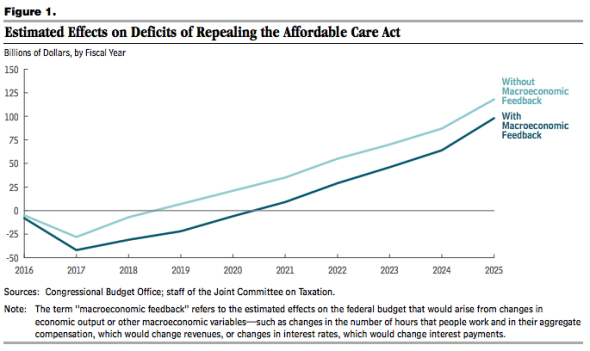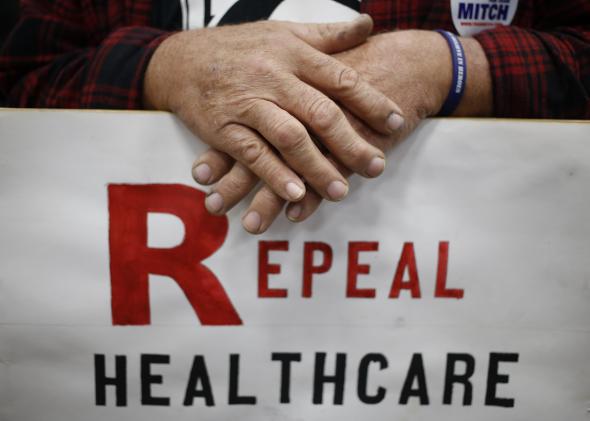With the Supreme Court getting ready to render a decision that could, theoretically, deal a crushing blow to the Affordable Care Act and throw the U.S. heath care system into chaos, the Congressional Budget Office has just released a helpful estimate of what would happen if Republicans got their wish and repealed the law entirely. The answer is pretty straightforward: The deficit would grow by as much as $353 billion over 10 years and 24 million people would eventually end up uninsured.
This is not the first time the CBO has predicted that a wholesale Obamacare repeal would be a budget buster. While the law spends lots of money to expand health coverage to more Americans,
it also pays for itself with the help of a number of taxes and savings from Medicare. What makes this report interesting is how it demonstrates that, even if you use the Republican Party’s preferred math, killing health reform still looks bad for the deficit.
When the GOP assumed control over all of Congress this year, one of its first official acts was instructing the CBO to start using “dynamic scoring” when assessing budget effects of major legislation. Traditionally, the CBO had used “static scoring,” which assumes that a piece of legislation won’t effect overall economic growth. With dynamic scoring, budgeters do exactly the opposite: They try to predict how people will change their behavior in response to tax cuts or increased government spending and adjust their projections about GDP appropriately.
This approach is controversial, because it requires the CBO to settle on a model of how fiscal policy moves the overall economy, which is a, you know, slightly contentious subject. But Republicans are fond of it because economists typically believe that tax cuts increase growth, which boosts IRS collections and makes lowering rates look less expensive for the government. The CBO has also previously predicted that Obamacare’s coverage extensions will cause fewer people to work, which in a dynamic analysis should shave a bit off of GDP and make the entire legislation look more costly.
No matter which way you run the numbers, though, it appears Obamacare is a money saver. If you use the old static scoring method, repealing the bill would cost the government $353 billion over a decade. If you use the dynamic approach, repealing it costs $137 billion during that time. The main difference, as Sarah Kliff noted earlier today at Vox, is that the CBO believes more people would work without the health reform law in place and GDP would be 0.7 percent higher, which boosts tax revenue in the dynamic model.

Jordan Weissmann
If there’s anything for the Republicans to grab onto, it’s that: The CBO says Obamacare is a slight drag on growth. Then again, that’s mostly because it gives people the opportunity to work a bit less if they want to and still get health coverage. Meanwhile, if the Republicans do ever want to offer a credible plan for replacing the health law, they’ll need to figure out a better way to extend insurance coverage to millions while simultaneously filling a massive budget hole they’ll have created.
